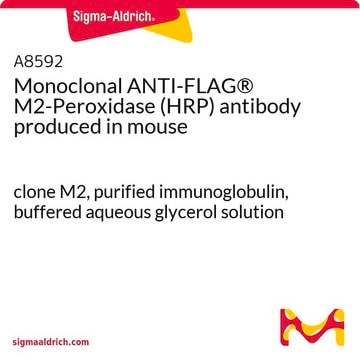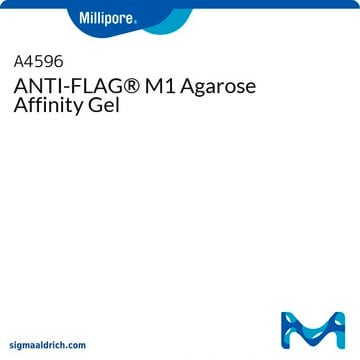P7457
Carboxy-terminal FLAG-BAP™ Fusion Protein
About This Item
Productos recomendados
form
liquid
mol wt
~49 kDa
shipped in
dry ice
storage temp.
−20°C
General description
Application
Biochem/physiol Actions
Other Notes
Physical form
Preparation Note
Legal Information
Storage Class
10 - Combustible liquids
wgk_germany
WGK 3
flash_point_f
Not applicable
flash_point_c
Not applicable
ppe
Eyeshields, Gloves, multi-purpose combination respirator cartridge (US)
Certificados de análisis (COA)
Busque Certificados de análisis (COA) introduciendo el número de lote del producto. Los números de lote se encuentran en la etiqueta del producto después de las palabras «Lot» o «Batch»
¿Ya tiene este producto?
Encuentre la documentación para los productos que ha comprado recientemente en la Biblioteca de documentos.
Los clientes también vieron
Artículos
Comparison of elution techniques for small-scale protein purification of FLAG® tag proteins using anti-FLAG® M2 magnetic beads.
Protocolos
Protocol for immunoprecipitation (IP) of FLAG fusion proteins using M2 monoclonal antibody 4% agarose affinity gels
Contenido relacionado
Técnicas, reactivos y protocolos de purificación de proteínas para purificar proteínas recombinantes utilizando métodos como la cromatografía de intercambio iónico, de exclusión por tamaño y de afinidad.
Protein purification techniques, reagents, and protocols for purifying recombinant proteins using methods including, ion-exchange, size-exclusion, and protein affinity chromatography.
Protein purification techniques, reagents, and protocols for purifying recombinant proteins using methods including, ion-exchange, size-exclusion, and protein affinity chromatography.
Técnicas, reactivos y protocolos de purificación de proteínas para purificar proteínas recombinantes utilizando métodos como la cromatografía de intercambio iónico, de exclusión por tamaño y de afinidad.
Nuestro equipo de científicos tiene experiencia en todas las áreas de investigación: Ciencias de la vida, Ciencia de los materiales, Síntesis química, Cromatografía, Analítica y muchas otras.
Póngase en contacto con el Servicio técnico











